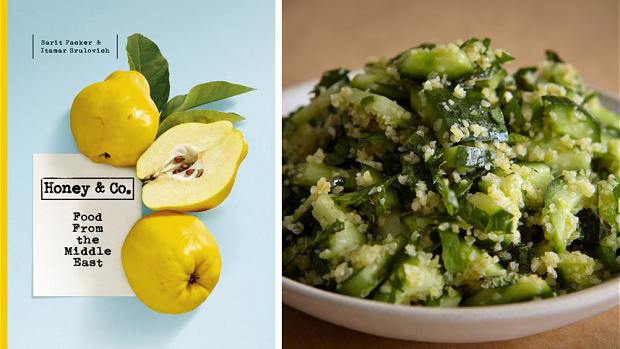Stephanie Jones: Book Review - Honey & Co: Food From the Middle East by Sarit Packer and Itamar Srulovich
- Publish Date
- Friday, 22 August 2014, 12:00AM

- Author
- By Stephanie Jones
Honey & Co: Food From the Middle East is a rare beast. It is not just a cookbook, not just a glossy, glorious lesson in Middle Eastern cuisine, but a biography of (and homage to) a restaurant. Both book and eatery are the work of the Israeli proprietors and founders of Honey & Co, the tiny 10-table restaurant tucked away in central London that since its opening in mid-2012 has attracted legions of regulars and praise from revered critics.
The book itself would look equally at home next to a hot stove or sexing up a coffee table: it is substantial but easy to handle, with a bright lemon-and-baby blue cover that features an illustration of quince, a fruit so favoured by the authors that in a recipe for ox cheeks with quince, they recommend “burying your face in a bowl of it” and “getting high on the smell.”
Which brings me to Honey & Co’s most winning non-culinary quality, its levity. Itamar Srulovich, co-author and co-owner with his wife Sarit Packer, has a cheeky sense of humour that (judging by his anecdotes about the early days of the restaurant, the recruitment policy and their many mishaps and adventures) is evident if you happen to visit. When they met as 20-somethings in their native Israel, Srulovich says, his skinny beach-bum persona was not an obvious fit for “a plump 24-year-old war machine with a Bolshevik work ethic and a spreadsheet for a brain.”
They bonded over food, each introducing the other to their favourite markets and restaurants in their home regions, falling in love over pigeon stuffed with pine nut rice, aubergine salad with taramasalata and kofta kebab, burek and lakerda – and this is all before you even reach Honey & Co’s delectable food photography, some of which features hands and fingers in a nod to “the hippy, happy, laissez-faire attitude of the Israeli cooking culture” and the meal-time staple that is pitta bread.
With categories incorporating mezze, canning and pickling, fresh salads and light meals, dips, spreads and purees, cured, ‘cracked’ and slow-cooked food, and thorough instruction on the art of falafel – plus plenty of choice for the flesh-averse – Honey & Co works as a comprehensive guide to the flavours and foods of the authors’ home region.
A chapter titled ‘Balls & Stuff’ is the heart of the book and probably the restaurant, they say, featuring several recipes for meatballs, a preparation for widely beloved stuffed vine leaves, and an intriguing beetroot kubbe dumpling soup, among other delicacies. Throughout, the more complex recipes are marked as such, and advice is given on good substitutions for hard-to-find ingredients – the kashkaval cheese that pops up time and again is easily replaced with pecorino.
The people know what they want: though the couple initially eschewed serving hummus because they were unable to find a version that suited both his austere Jerusalem palate and her preference for the rich creaminess of tahini and the kick of lemon and cumin, somehow a batch is made and consumed every day at the restaurant, though it’s never been added to the menu. Fittingly, the book offers several versions of staple foods to account for disparate geographical influences.
As the authors hope, Honey & Co: Food from the Middle East captures and distills the essential magic of “our little restaurant and the hive it is.” Their devotion to their customers, many of them very frequent diners, and the food of their Middle Eastern heritage is visible on every page.
Take your Radio, Podcasts and Music with you

